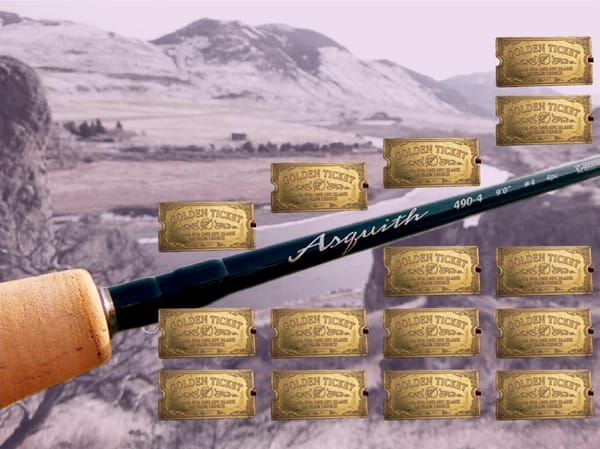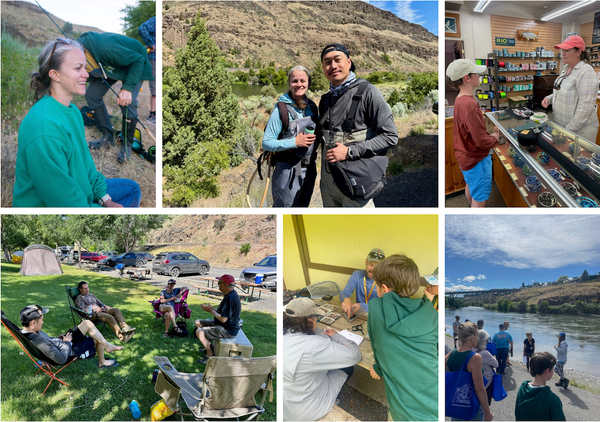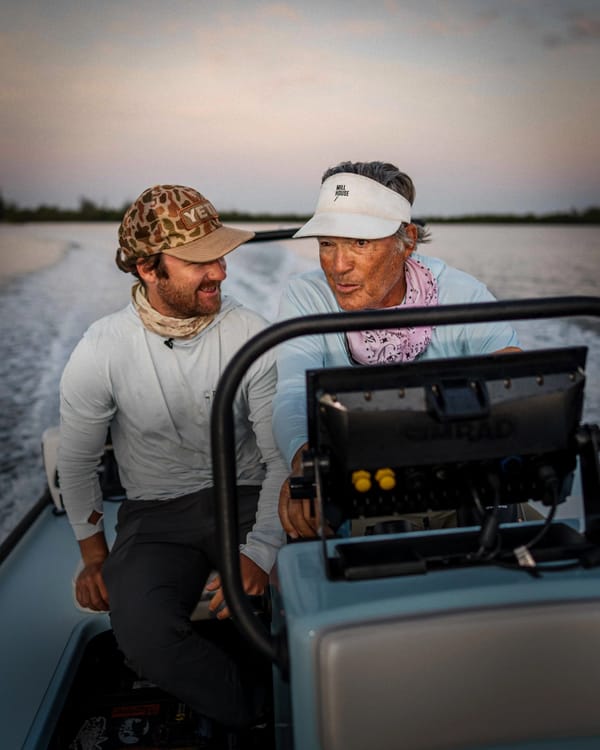How to make your kids hate fishing
Re-writing the old tired playbook of fishing as achievement and productive time in favor of something more curious and explorational.
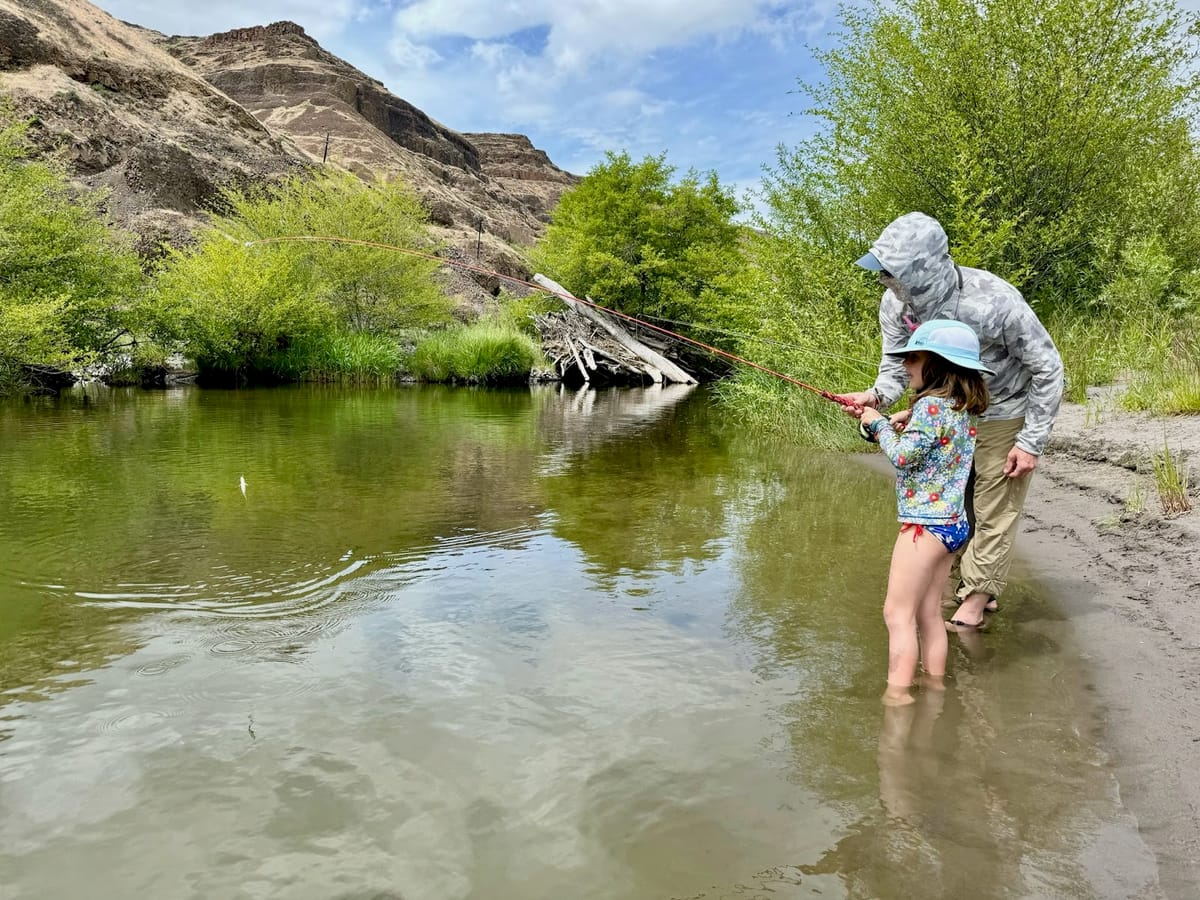
Guest-writing at The New Fatherhood
You may have already known this, but I'm a dad. A relatively new one, compared to many CFS readers. But, a dad nonetheless: with about 7 years and eleven months of experience, to hear her tell it, as her birthday approaches.
And being a dad has impacted my fishing. Not just in dialing it back to be a more present partner and parent, but also in introducing it to my daughter.
I really love what my buddy Kevin Maguire over at The New Fatherhood is doing, to build a community of dads around a new way of being in the world. He's helping dudes re-write the DadOS for entirely new parameters and challenges that come with being a parent in this day and age.
So I was really pleased to be able to share an idea with the New Fatherhood crew: How to Make Your Kids Hate Fishing.
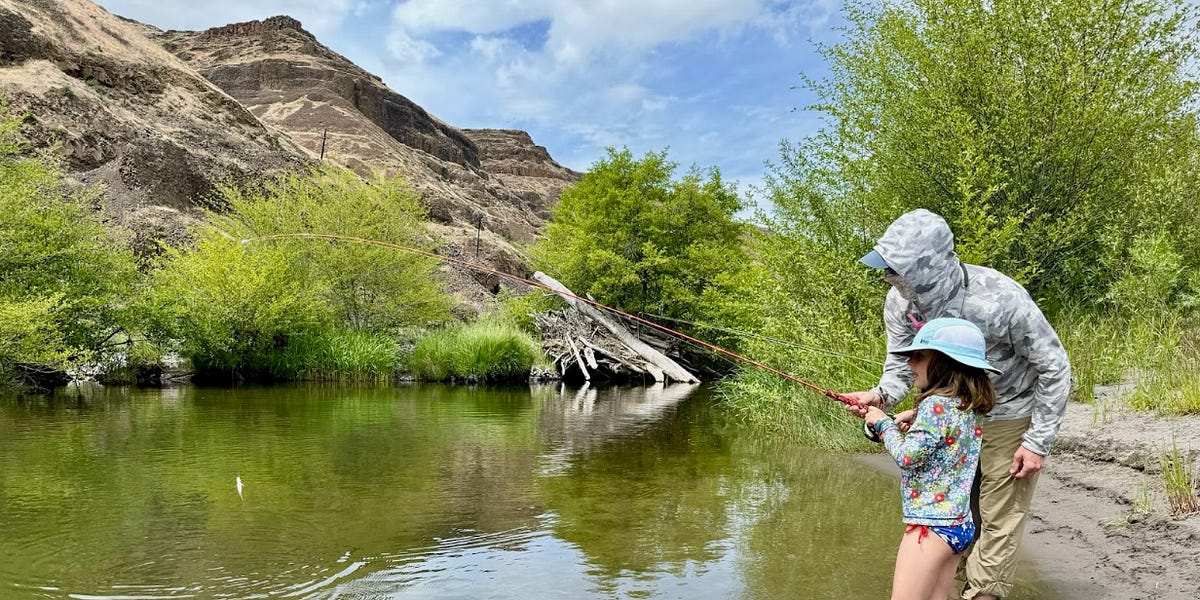
Go on, give it a read over at the New Fatherhood.
How to make yourself hate fishing
Of course it's ironic: I don't want your kids, or any kids, to hate fishing. But it's easy to lapse into a lot of the behaviors I describe when kids are around.
And, bonus: It's easy to treat ourselves that way, too. To push too hard, when we deserve an easy time. When you read the essay, think about it: Don't some of these sound like how I might talk to myself? I know I push too hard, a lot of the time.
Unless you're a guide, fishing isn't a job, and shouldn't feel like a chore. Sure, re-tying your fly for the tenth time is a pain. But there's a reason fishing is usually looked upon as a past time of the indolent and detached. Go easy on yourself, and enjoy your leisure.
Anyway, here's the full essay, based on Rivendell Bicycle Works founder (and avid fly-fisherman) Grant Petersen's "How to Make the Rest of Your Family Hate Riding" from Just Ride.
How to Make Your Kids Hate Fishing
It's summertime, and that means your kids are home from school—and probably complaining about being bored, despite everything you've planned and acquired for their amusement and enrichment.
At some point, whether they see you doing it, learn from kids at school, or watch the new season of Alone Australia, they may come to you with the ultimate dad request: Can we try fishing?
Lo and verily! Prepareth thine rods! The child hath ascended a rung upward on the ladder of personhood! This rite of passage carries weight and meaning at every step. So remember:
- This is very important stuff. You are their guide and, most crucially, the ambassador to the wide world of angling and the great outdoors. Their success—in fishing and therefore in life, as successful providers engaging in one of the most primal human endeavours—depends on your ability to get them onto fish. Lots of fish. If they are not successful at catching fish, you are not successful at being a parent, partner, and person. And, ultimately, everyone in your life may utter the five most terrifying words in the English language: "I want my money back." Your value as a human being hangs in the balance. Do not screw this up.
- Bait fishing is verboten. Do you really think that dunking worms is a vehicle for social mobility, let alone a college scholarship? FIPS-Mouche (the International Sport Fly Fishing Federation) National Youth Team selection starts at 14. Waste no time with spinners, crankbaits, glide baits, skirted jigs, rubber worms, actual nightcrawlers, maggots, PowerBait, dough balls, krill powder, or the like.
- Insist that they practice in non-fishing situations. Before you go, drill them on their casting at a local park. Starting on the water is a luxury. They earn the trip to the river when they have demonstrated proper fly-casting aptitude and, most importantly, the ability to follow your precise instructions.
- Make sure they understand how fragile and valuable your rods are, and how carefully they must treat them. The key is a short, sharp correction on the first fault: "ROD ON THE GROUND!" in a shrill blast with an outstretched finger ensures the lapse will not be repeated. Otherwise, they will desecrate your pristine gear.
- While casting practice is happening, expose your brood to broad etymological and ecological knowledge. Make sure they know the difference between the thalweg and a thermocline and the Ephemerellidae versus Ephemeridae. Keynote or PowerPoint slideshows and at-home pre-briefings are valuable here.
- Dawn patrol gets the fish. Try to get on the water as early in the day as local regulations allow. Around civil twilight—where the sun’s center is 6° below the horizon—is ideal to be set up and ready to go.
- Offer critique at every stage, as you see it, in real-time. Casting flaws, when their drift is dragging, on the retrieve. If you see something wrong, let them know immediately.
- Don't go home until you catch one. Remember, catching a fish is the whole point. Raining? Cold? Too bad.
- Above all else, don't let them botch it. If they're not having much success, take the rod yourself, do it for them, then put the rod in their hands for them to reel in the fish. Same goes for when they catch a fish for themselves. Grab the rod and reel it in yourself to make sure they don't lose it.
Sounds fun? Exactly. But that’s how dads used to do it. Toss in a fair bit of latent frustration and a tinderbox wadded tight with subsurface anger—with maybe a few glugs of blackberry brandy along the way—and you’ve got the right mix. And let’s face it: that’s miserable for everyone. Big Sports Parent Energy in the outdoors is a recipe for disaster. While rethinking this entire enterprise of fatherhood to establish gentler, non-hierarchical relationships with each other, and nature as an extension, let’s reset.
Growing up in the U.S., there was a popular public service announcement that summed it up rather well and stuck with me: “Take me fishing.” It’s more than a request for a skill—it’s an entry point for growing a relationship. Here's what actually works:
- Ignore the dogma. All the dogma. Just be there. If you've got a fly rod your kids can use, great. There are also a few kid-friendly fly rods out there that are just as much fun for adults. But if you just want to set them up with a spinning rod, that's cool too. Digging up the worms for bait is half the fun. As is cutting up hot dogs to hand-fish crab off the pier. Here's what's important: It's their tool to build their relationship with.
- Gear is there to be used. It's helpful to have beater gear for kids to learn on, but it's more important to let go and understand that accidents happen and rods get broken. It'll take time, but you’ll be surprised how quickly they learn to treat things carefully.
- If it breaks, figure out how to fix it together. As poet Patrick Ramsay puts it, in a lovely poem about things he learned from his dad: "...empathy is the muscle of longevity...maintenance is the only lost language I already know...he reminds me that building something takes guts…but rebuilding something, that's about heart.”
- Keep the instruction minimal. Don't obsess over flies or arcane specifications. Fish eat stuff. Anglers try to fool them. Once you're fishing, "try and cast it here", "a little farther next time", or "lift!" are the only kinds of commentary you need. Be a fan first. Even commiserating can be a form of cheerleading (“WHOA! Did you see the size of that one?”).
- "Proper" casting is overrated. Especially for kids. Don't let perfect be the enemy of fun. If it gets the fly or bait out there, it's a winner. Stick with an indicator-nymph rig for absolute beginners: the added weight makes it easier for anyone to cast.
- Don't make it a death march. You don't need to get out there early. Evenings are fishier anyway. If you're camping near a lake or a river, bring a rod down after dinner and "have a look." Make it an after-dinner, up-past-bedtime activity.
- Just get outside. "Let's go fishing" should not mean in two weeks’ time, or next year at grandma's. Find a place near you and check it out. Tonight. Be impulsive. You don't need to fish the first time to see if there might be fish. For some kids, your attention plus some impulsivity and a break from routine can be the best adventure spice you can add. If you don't have any idea of where fishing near you might be an option, take the Big Here Quiz.
- Let their curiosity drive the bus. Kids know instinctively how to have fun outside, whereas adults have to attach productive activities to outside time. Let their curiosity lead the way. Here is a short list of things I've gotten to do under the auspices of going fishing:
- Make sandcastles
- Dig canals
- Float logs
- Trap crayfish
- Skip stones
- Call birds
- Call fish (not effective)
- “Go to the spa” (actually quite nice)
- Build cairns, then kick them over (v. soothing)
- It's not important to catch a trout. It's probably better if you go for something local anyway. Whatever the most common fish are near you. For us in the United States, those are the proud and mighty bluegill. What might be living in that golf course pond? Bass? Carp? Roach? Tench? My daughter's first fish was a Northern pikeminnow. A fish so invasive the state pays a bounty on ‘em. She didn’t care that it was a trash fish, she was just stoked to learn she could get paid to catch fish and formulated a plan to let it grow in a tank at home to reach minimum size.
- It doesn't even matter if you catch a fish. Spending time together by the water is the achievement. That will be the memorable part. And, believe it or not, kids get bored catching fish faster than adults. By the third or fourth, it might as well be a chore.
- Nobody’s perfect. And nature’s never predictable. Things will get tangled. Someone may even get a hook stuck in them. (Forewarned is forearmed.) You may, in your haste, grab the rod from your kid. (See the photo above.) It’s OK. We make mistakes. If you keep it simple and laugh off the mess-ups, you’ll all want to go again.
- If you're having fun, they're having fun. This is not a pass-fail exercise. In fact, no one will even be testing you. The only goal is for everyone to be out there. As with much in life, there's nothing to be gained by starting in Nightmare mode when you can fart around in the sandbox for a while and get your sea legs.
If your father was a hard-charger, try to channel an inner grandpa. Papa Nature, the kind of chill old guy who’s seen it all. He just wants to take a ride after supper down to the lake. To check out the water. Maybe see some deer. And, sure, we can wet a line.
Instead of continuing a previous generation's conquering-dominator mindset, us dads have the unique opportunity to re-cast nature into a new role, one in which we're curious participants full of wonder at its surprises. Luckily, we have great teachers by our side to show us how.
RSVP today for our next Read By the River virtual book club on August 27th. Find out more on our book selection, and what to expect:
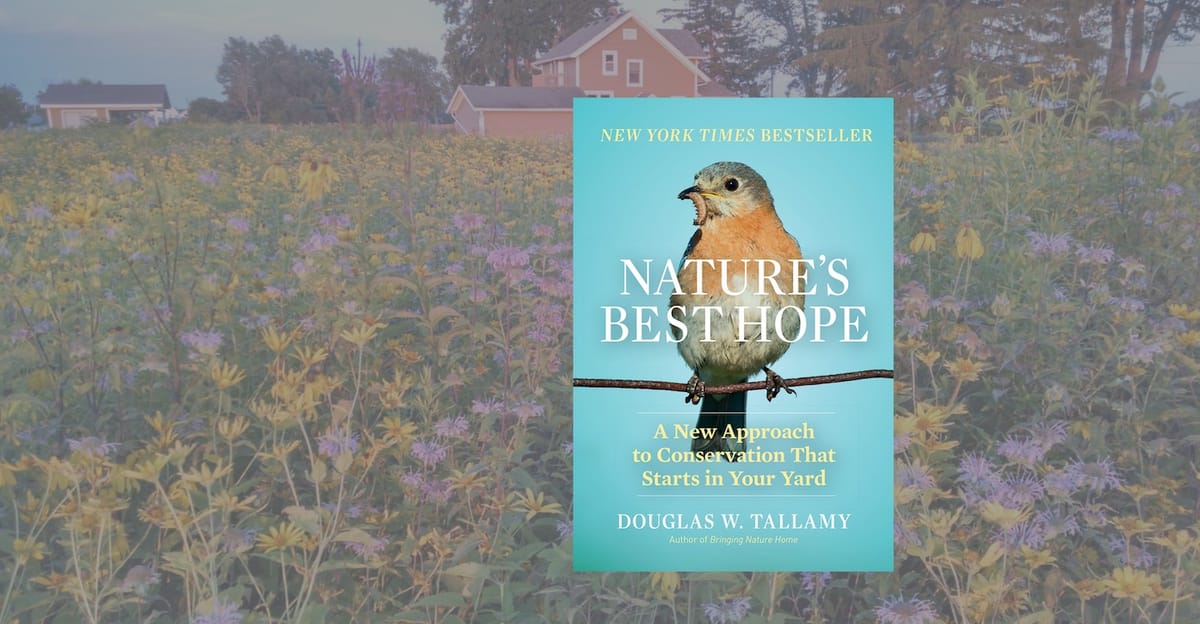
(Stay tuned for an announcement on the fly-tying class that we'll be offering through PCC this Fall Term!)



